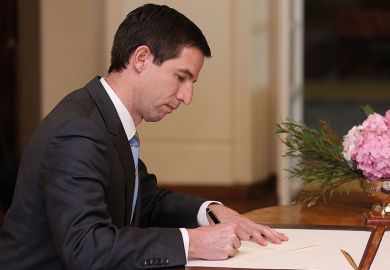Political short-termism and a failure to set a clear strategy for a mass higher education system are among the key worries of Australian university leaders, according to a major report seen as relevant for other nations’ sectors.
Australian Universities at a Crossroads: Insights from their Leaders and Implications for the Future, based on interviews with 117 university and policy leaders, explores the impact of the major turbulence in the country's higher education policies in recent years. A variety of plans have emerged from successive Liberal-led governments to raise fees and cut funding, the latest of which may again not make it through Parliament.
In one section of the survey, respondents rated the importance they assigned to 32 issues. Internationalisation, student learning outcomes, addressing the needs of society and strategic planning “were rated most important for the future of the system”, the report says.
In response to open-ended questions, “numerous leaders raised the need to review and restructure the sector to diversify institutional goals and functions and to seriously consider merging and/or reducing the number of institutions”, the report notes.
One respondent, a senior vice-chancellor, said: “Australia has too many universities for its population.”
Meanwhile on policy, a vice-chancellor from a university in the Group of Eight – which represents research-intensive institutions – said: “The lack of a bipartisan agreement on education being a national priority has been an immense frustration.”
Australia has a system of income-contingent loans and uncapped student numbers similar to England. Another respondent to the study complained that issues around massification have been “left to student choice and so called markets", rather than being the responsibility of a government endeavouring to ensure public good. "What are we producing here? Are we prepared to let certain disciplines fade away? Who has responsibility for the national interest?” the respondent added.
A Group of Eight vice-chancellor said: “I think our trajectory is pretty similar to public universities in the United States and in the UK and Canada so I don’t think there is anything special about us. Government is reluctant to pay the cost of massive expansion.” Australian universities would consequently rely on international student numbers, and on borrowing for the capital spending needed to maintain institutions, the interviewee continued.
“That is taking us into a very different world: little government income, total reliance on fees, highly geared – so a really disruptive technology could be fantastically difficult to manage in those circumstances,” the vice-chancellor added.
One former institutional leader criticised vice-chancellors over their initial backing for the government's plans to deregulate fees, which were later abandoned, saying they had "lost any moral compass" as a group.
The study's lead authors were William B. Lacy, professor of sociology at the University of California, Davis and affiliated professor at the Center for Studies in Higher Education at the University of California, Berkeley, and Gwilym Croucher, senior lecturer at the Centre for the Study of Higher Education, University of Melbourne.
Professor Lacy told Times Higher Education that the Australian system faced “internal issues...as well as significant external changes, including the global neoliberal transformation of higher education". "Unless successfully addressed, these developments and challenges may inhibit Australian universities from continuing to perform above expectations and as global leaders," Professor Lacy said.
“A big lesson from the report is that leaders across Australian higher education, government and the academy agree it is no longer good enough to look only to the next few years," Dr Croucher added. "A long-term strategic view over the next 15-20 years is unavoidable if universities are to continue to thrive."
Register to continue
Why register?
- Registration is free and only takes a moment
- Once registered, you can read 3 articles a month
- Sign up for our newsletter
Subscribe
Or subscribe for unlimited access to:
- Unlimited access to news, views, insights & reviews
- Digital editions
- Digital access to THE’s university and college rankings analysis
Already registered or a current subscriber?








